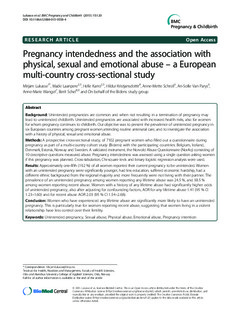| dc.contributor.author | Lukasse, Mirjam | |
| dc.contributor.author | Laanpere, Made | |
| dc.contributor.author | Karro, Helle | |
| dc.contributor.author | Kristjansdottir, Hildur | |
| dc.contributor.author | Schroll, Anne-Mette | |
| dc.contributor.author | Van Parys, An-Sofie | |
| dc.contributor.author | Wangel, Anne-Marie | |
| dc.contributor.author | Schei, Berit | |
| dc.date.accessioned | 2015-06-03T05:38:30Z | |
| dc.date.accessioned | 2015-07-31T13:28:20Z | |
| dc.date.available | 2015-06-03T05:38:30Z | |
| dc.date.available | 2015-07-31T13:28:20Z | |
| dc.date.issued | 2015 | |
| dc.identifier.citation | BMC Pregnancy and Childbirth 2015, 15(120) | nb_NO |
| dc.identifier.issn | 1471-2393 | |
| dc.identifier.uri | http://hdl.handle.net/11250/294101 | |
| dc.description.abstract | Background: Unintended pregnancies are common and when not resulting in a termination of pregnancy may
lead to unintended childbirth. Unintended pregnancies are associated with increased health risks, also for women
for whom pregnancy continues to childbirth. Our objective was to present the prevalence of unintended pregnancy in
six European countries among pregnant women attending routine antenatal care, and to investigate the association
with a history of physical, sexual and emotional abuse.
Methods: A prospective cross-sectional study, of 7102 pregnant women who filled out a questionnaire during
pregnancy as part of a multi-country cohort study (Bidens) with the participating countries: Belgium, Iceland,
Denmark, Estonia, Norway and Sweden. A validated instrument, the Norvold Abuse Questionnaire (NorAq) consisting of
10 descriptive questions measured abuse. Pregnancy intendedness was assessed using a single question asking women
if this pregnancy was planned. Cross-tabulation, Chi-square tests and binary logistic regression analysis were used.
Results: Approximately one-fifth (19.2 %) of all women reported their current pregnancy to be unintended. Women
with an unintended pregnancy were significantly younger, had less education, suffered economic hardship, had a
different ethnic background from the regional majority and more frequently were not living with their partner. The
prevalence of an unintended pregnancy among women reporting any lifetime abuse was 24.5 %, and 38.5 %
among women reporting recent abuse. Women with a history of any lifetime abuse had significantly higher odds
of unintended pregnancy, also after adjusting for confounding factors, AOR for any lifetime abuse 1.41 (95 % CI
1.23–1.60) and for recent abuse AOR 2.03 (95 % CI 1.54–2.68).
Conclusion: Women who have experienced any lifetime abuse are significantly more likely to have an unintended
pregnancy. This is particularly true for women reporting recent abuse, suggesting that women living in a violent
relationship have less control over their fertility.
Keywords: Unintended pregnancy, Sexual abuse, Physical abuse, Emotional abuse, Pregnancy intention | nb_NO |
| dc.language.iso | eng | nb_NO |
| dc.publisher | BioMed Central | nb_NO |
| dc.title | Pregnancy intendedness and the association with physical, sexual and emotional abuse - a European multi-country cross-sectional study | nb_NO |
| dc.type | Journal article | nb_NO |
| dc.type | Peer reviewed | en_GB |
| dc.date.updated | 2015-06-03T05:38:29Z | |
| dc.subject.nsi | VDP::Medical disciplines: 700 | nb_NO |
| dc.source.volume | 15 | nb_NO |
| dc.source.journal | BMC Pregnancy and Childbirth | nb_NO |
| dc.source.issue | 120 | nb_NO |
| dc.identifier.doi | 10.1186/s12884-015-0558-4 | |
| dc.identifier.cristin | 1245558 | |
| dc.description.localcode | © 2015 Lukasse et al.; licensee BioMed Central. This is an Open Access article distributed under the terms of the Creative Commons Attribution License (http://creativecommons.org/licenses/by/4.0), which permits unrestricted use, distribution, and reproduction in any medium, provided the original work is properly credited. The Creative Commons Public Domain Dedication waiver (http://creativecommons.org/publicdomain/zero/1.0/) applies to the data made available in this article, unless otherwise stated. | nb_NO |
